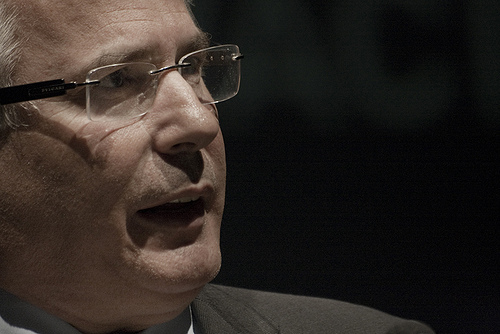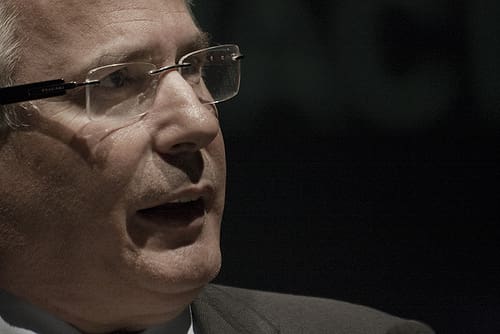 Update: Judge Garzón was convicted today 9 February 2012 in a ruling of Spain’s Supreme Court in the Gurtel case described in this post. Judge Garzón is banned from the judiciary for 11 years and is still facing trials in two other cases.
Update: Judge Garzón was convicted today 9 February 2012 in a ruling of Spain’s Supreme Court in the Gurtel case described in this post. Judge Garzón is banned from the judiciary for 11 years and is still facing trials in two other cases.
Spanish judge Baltasar Garzón appeared on 17 January before the Spanish Supreme Court in the first of three pending trials against the judge who pioneered recent prosecutions of those most responsible for international crimes. Contributor Pia Navazo has been monitoring the Spanish press for LoR.
The current case against Judge Garzón, which began in the Spanish Supreme Court this week, alleges malfeasance (prevaricación) and the violation of constitutional rights regarding the issuing by Garzón of judicial instructions to intercept lawyer-client communications in the Gürtel case. The Gürtel cases involved allegations against a network of businesses which are accused of giving money and gifts to members of Spain’s Partido Popular (Popular Party) in exchange for government contracts. The Partido Popular swept back to power in December 2011 after Spain’s national elections.
The case against Garzón was brought to Court as a private prosecution, which Spanish law allows, by the defense lawyers involved in Gürtel, after the State Prosecutor (Fiscalía) asked that the charges against Garzón be dropped. Mr. Garzón denies all charges against him.
During his first day in court this week, most of the testimony was related to procedural issues. Judge Garzón stated that information provided to him by the police indicated that the defendants in the Gürtel case may have been committing crimes from prison. He ordered the tapping of conversations between the defendants in order to establish whether violations of anti-money laundering statutes were being committed and to prevent the continuation of any criminal activity.
Supreme Court Justice Alberto Jorge (who conducted the preliminary investigations against Garzón) declared that illegal wiretaps constitute a grave outrage against the rule of law and against one of the pillars of Spanish democracy, namely the right to a legal defense and lawyer-client confidentiality.
But, according to Judge Garzón, the right to defense was at all times respected. Judge Garzón pointed out that none of the proceedings in the case in question contain references to the tapped communications, and that the taps only affected communications between the defendants, not those of the lawyers. As a result, he claims never to have been aware of their defense strategy.
Interestingly, the State Prosecutor – which under Spanish Law is a party to a private prosecution – is also of the view that the right to defense was respected. During the course of the Gürtel case, the Judge Garzón’s decision to tap the communications was not challenged by the Prosecutor. In the hearings this week, Garzón pointed out that the State Prosecutor did not challenge the measures and in fact supported them.
Judicial Confrontation
At an earlier stage of the proceedings, Judge Garzón had challenged the impartiality of the Supreme Court Justices sitting in judgement on his case, specifically Justices Varela and Marchena. Both the Supreme and the Constitutional Courts rejected the challenge, but during this week’s appearance Judge Garzón repeated the challenge. It was rejected again.
His challenge is based in part on the fact that the two justices are conducting the preliminary investigations into the other two pending private prosecutions cases against Judge Garzón: one brought for his attempt to investigate crimes committed during the Franco dictatorship and the Spanish Civil War, the other brought for allegedly accepting irregular financial support stemming from courses given by him at New York University in 2005-06.
In addition, Garzón’s writ of defense alleges that Justice Varela may have acted partially by giving to Garzón’s accusers (the right-wing associations Manos Limpias and Falange Española) specific indications as to how to amend their accusation writs which, Garzón alleges, were invalid and would like have been rejected. Apparently, Justice Varela is also alleged to have used personal and disqualifying language against Judge Garzón, which would prove the former has a prejudicial view of Garzon. This – says Garzón’s writ of defense – is evidence of an “absolute lack of subjective impartiality”. No surprise, then, that the Spanish press has been reporting the possibility of personal conflicts between Varela and Garzón.
Judicial Independence in the Balance
On 24 January, Mr. Garzón will appear in Court again, this time in connection with the second case, which alleges criminal malfeasance in relation to his acceptance of jurisdiction to investigate human rights abuses, illegal detentions and enforced disappearances during the Franco dictatorship and the Spanish Civil War.
Garzon’s decision to pursue the investigation is perceived as a direct challenge of the Spanish Amnesty Law for Political Acts, which was passed during the transition to democracy in 1977.
In 2006, Judge Garzón commenced investigations in thengrounfs that international law (which is part of Spanish Law according to Spanish Constitution) allowed an investigation regarding crimes against humanity. In his interpretation, the Amnesty Law did not preclude the investigation of the crimes against humanity in question. As a result of the commencement of investigations, the Judge is being criminally prosecuted for his interpretation of law, under the charges of malfeasance (abuse of power). He has been provisionally suspended.
On March 2011 Judge Garzón filed a case before the European Court of Human Rights challenging the lawfulness of his criminal prosecution for opening these investigations. It is worth noting that criminal prosecution of judges under this charge is very uncommon in Spain.
The case is key for the independence of judges in Spain and their ability to interpret the Law. All three cases brought against him are going forwards under the shadow of suspicion of being a politically motivated attempt to stop him prosecuting crimes perpetrated during the Franco dictatorship.
International press reported this week’s hearings, highlighting how the cases against Mr. Garzón have sparked controversy and how some of his past cases became political irritants in Spain. In the English press, Garzón is mainly referred to as the Judge that ordered Chilean dictator Pinochet’s detention.
For its part, the Spanish press echoes the sense that Spain faces a problem of impunity. They point out that the cases being pursued by Garzón began at the request of victims’ associations seeking to discover the truth, not least as to the whereabouts of mass graves dating back to the Civil War. In addition, the Spanish legal profession faces the challenge of trying to manage the contradiction of Spain’s “Pact of Forgetting” as manifested by the Amnesty Law and the international law principles and practice that recognize no amnesty for serious human rights crimes.
Garzón’s accusers in the illegal taps case are demanding between 10 and 17 years of suspension from legal profession for Mr. Garzón, which alone may end his career. The other two pending proceedings also demand his suspension from legal profession (he has been temporarily suspended since May 2010). If they all succeed, the periods of suspension will not run concurrently but will be added together.
Whatever the outcomes of these cases, the future and independence of the Spanish judiciary is facing a significant test.
Pia Navazo, Contributor
Image: elfer
